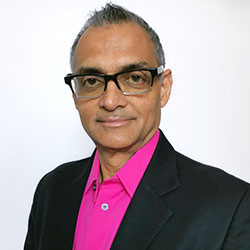Beyond Anthropocentric Design
SUSTAINABLE TRANSFORMATION SEMINARS

The Sustainable Transformation Seminars series autumn 2023 third seminar is held by speaker Prasad Boradkar, Dean, College of Design at the University of Minnesota, with the title "Beyond Anthropocentric Design". The format is a 25-minute presentation and 20 minutes of guided and open discussion with a KTH moderator/host.
Tid: Fr 2023-11-17 kl 12.15 - 13.00
Plats: Online
Seminar description
In the disciplines of design, business, and engineering, practitioners and scholars have been showing a greater interest in human-centered design that emphasizes the primacy of people in the design process. This emphasis on putting people at the center of design methodology has undoubtedly led to products and services that have been truly beneficial to the people for whom they have been designed.
However, by focusing primarily on people as recipients of design services, we have adopted a myopic and limited perspective of the impact of our work as designers and innovators. The consequences of design activity reach far beyond humans. We are, after all, one of several million species who live on this planet. Why then, should our design be so anthropocentric? Can we not design products and services keeping in mind not only people, but also other species and entire ecosystems? Can we not envision the potential impacts of all that we design not only on people, but on all inhabitants of our biosphere?
If we refresh the paradigm of anthropocentric thinking and human-centered design to biocentric thinking and life-centered design, our solutions might exhibit a sense of care that extends beyond people. In addition to acting in neighbourly ways towards other species by including them in our design goals, we can also learn from them. And this is where we can turn to biomimicry, a field of study described by Janine Benyus as innovation inspired by nature. “Unlike the Industrial Revolution, the Biomimicry Revolution introduces an era based not on what we can extract from nature, but on what we can learn from her” (Benyus, 1997: 2). Biomimicry can certainly inspire ingenious solutions to thorny problems, but its true promise lies in helping us devise solutions that are ecologically sound.
Biography Prasad Boradkar, Dean, College of Design, University of Minnesota

Prasad Boradkar is the dean of the College of Design at the University of Minnesota. Previously, he led user research and sustainability efforts at Google ATAP in Mountain View, California. He is also a professor emeritus in Industrial Design at Arizona State University (ASU) in Tempe, where he served as co-director for the Biomimicry Center and InnovationSpace.
The Biomimicry Center is an organization dedicated to the exploration of biologically-inspired solutions to tackle the challenges of sustainable development. InnovationSpace is a transdisciplinary laboratory where faculty and students from design, business, sustainability, and engineering partner with corporations to develop product concepts that hold societal benefit while minimizing impacts on the environment. Prasad is the author of Designing Things: A Critical Introduction to the Culture of Objects (2010) and co-editor of Encountering Things: Design and Theories of Things (2016).
Connection to Sustainable Development Goals (SDGs)
- SDG 9: Industry, Innovation, and Infrastructure
- SDG 11: Sustainable Cities and Communities
Contact
Prasad Boradkar email:
prasadb@umn.edu
Prasad Boradkar webpage
Registration
Related
About the Sustainable Transformation Seminars
Seminars archive

